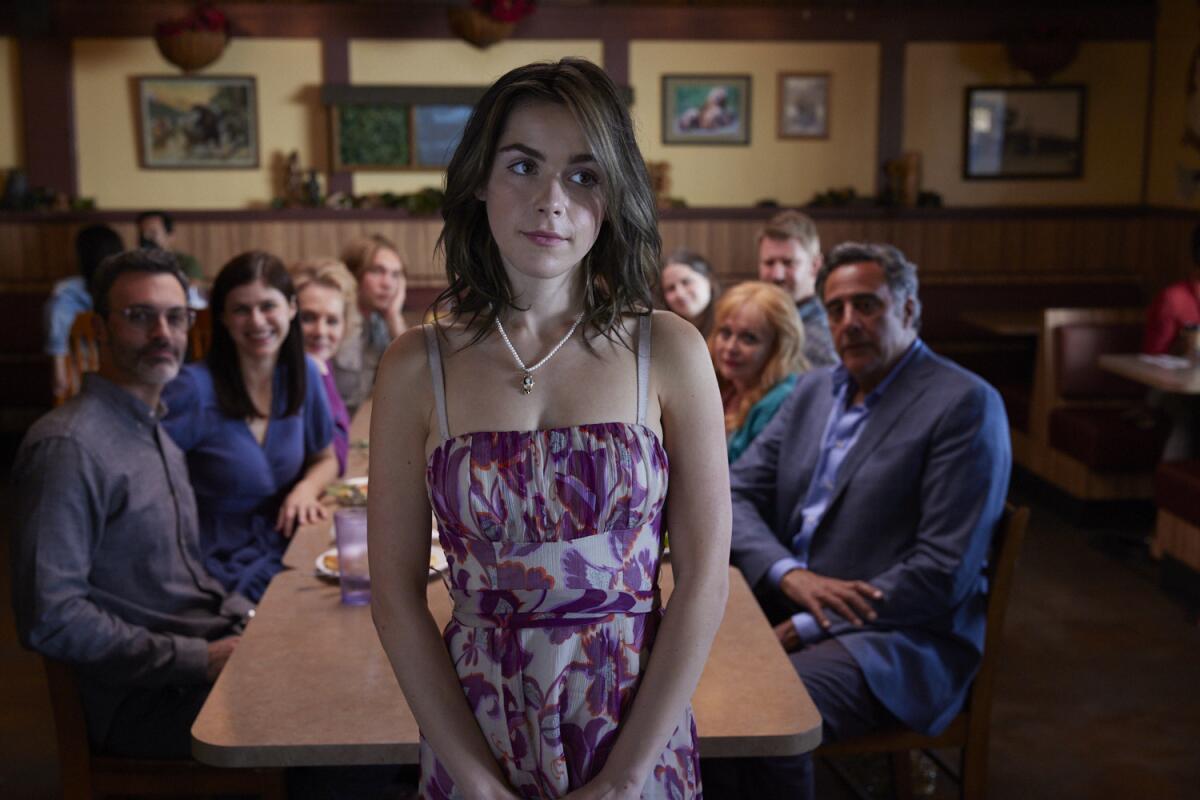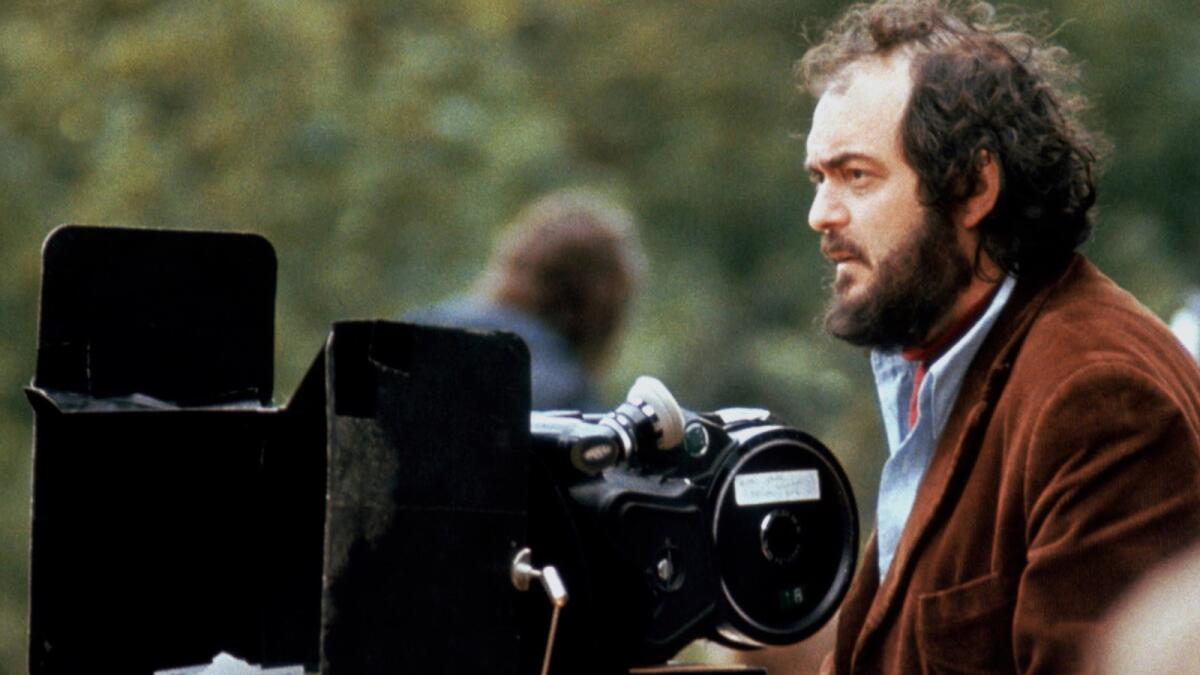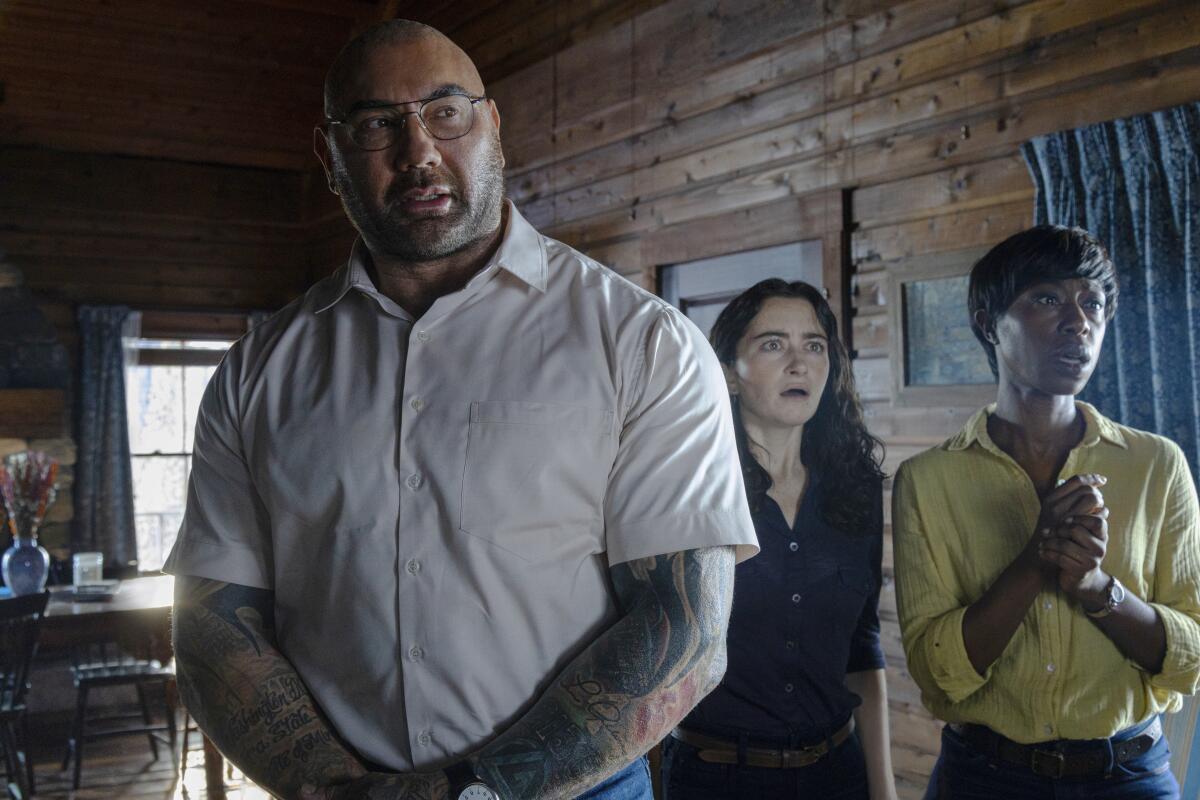Review: Kiernan Shipka, Reggie Jackson and Stanley Kubrick highlight VOD, streaming options

‘Wildflower’
The meant-to-be-inspirational film “Wildflower” may be based on a true story, but it strains against its own artificiality. Kiernan Shipka gives a terrific performance as Bea Johnson, a bright and talented Las Vegas high schooler who worries that when she leaves for college, her developmentally disabled working-class parents — played by Dash Mihok and Samantha Hyde — won’t be able to take care of themselves. But while director Matt Smukler and screenwriter Jana Savage deliver moments throughout the film that feel vividly real, too often they veer into the maudlin or cutesy, as though trying to soften this material for the broadest possible audience.
The film is structured cleverly, beginning with Bea unconscious in a hospital, narrating her story in voiceover as the various members of her family talk to a social worker. The actors playing Bea’s family are powerhouses: Jean Smart and Brad Garrett as her mom’s fussy parents; Jacki Weaver as her dad’s free-spirited mother; and Alexandra Daddario and Reid Scott as her snooty aunt and uncle. She’s also visited by her boyfriend Ethan (Charlie Plummer), a cancer survivor who like a lot of the kids in their ritzy private school has a hard time understanding what Bea’s more marginalized, hand-to-mouth childhood has been like.
The best parts of “Wildflower” involve Bea and Ethan’s romance, which is genuinely sweet and realistically lusty, even as it’s complicated by the challenges of their differing social classes and Bea’s many anxieties. But the characters’ raw and realistic interactions compete with scenes where Bea’s family behaves like they’ve just stepped out of a sitcom, delivering punchlines and acting wacky. “Wildflower” seems to be aiming to be a crowd-pleaser like the similar, Oscar-winning “CODA.” But while that movie had its share of compromises for the sake of melodrama, its performances always felt lived-in. The characters in this film, on the other hand, too often feel like their dialogue and behavior has been cut-and-pasted from other quirky indie dramedies.
‘Wildflower.’ R, for some language, teen drinking and a sexual reference. 1 hour, 45 minutes. Available on VOD
‘Reggie’
About halfway thorough Alexandria Stapleton’s documentary “Reggie,” the baseball Hall of Famer Reggie Jackson talks about some of the great Black players who preceded him in the game — such as Hank Aaron, Bob Gibson and Frank Robinson — and notes that because they tended to wear serious expressions on their faces, the press labeled them as “angry” or “bitter.” Jackson, on the other hand, was often seen smirking, so the media called him “arrogant.” According to Jackson, at no point did these reporters try to understand what he understood: that he and his colleagues just wanted to be treated with dignity, like any other human being.
“Reggie” takes a multitiered approach to Jackson’s story. About two-thirds of the movie has Jackson giving a straightforward account of his dramatic baseball journey: starting as a hot-shot Oakland A’s rookie; helping to lead the team to multiple World Series; becoming one of the first faces of the free agency era; achieving superstar status while mired in the ongoing soap opera that was the late-‘70s New York Yankees; and then fighting hard after retirement to find a place on the game’s executive side. The rest of the film directly tackles the racism Jackson and his peers faced throughout their careers and features Jackson talking to other Black athletes about their common experiences.
All of these topics are thoughtfully explored and given a strong emotional undercurrent by Jackson’s own passion. There are times, though, when Stapleton’s disjointed structure is distracting. Also, by centering so much of the narrative on Jackson’s voice rather than on the people who worked alongside him over the years, the film’s perspective can feel limited.
Still, Jackson is as charismatic now as when he was a ubiquitous presence on TV in the ‘70s. Back then, skeptics tried to describe him in ways that limited his accomplishments — dismissing him as selfish or a showboat. The truth was far more complicated; and one of Jackson’s great triumphs is that he was great enough and persistent enough to make that truth undeniable
‘Reggie.’ PG-13, for strong language including racial slurs. 1 hour, 44 minutes. Available on Prime Video

‘Kubrick by Kubrick’
Director Stanley Kubrick had a reputation in his lifetime for being hermetic and aloof, because he declined most interviews and didn’t make a lot of public appearances. But in the decades since he died in 1999, a lot of people who worked with Kubrick or knew him personally have said he was surprisingly approachable with a lively sense of humor. He worked his casts and crews hard — sometimes infamously hard — but he wasn’t some mad genius in a tower.
For those of us who will never get to meet Kubrick, Gregory Monro’s documentary “Kubrick by Kubrick” is about as close as we’ll get to spending time with him on a one-to-one level. At just over an hour long, the movie is too short to go very deep. But then Kubrick himself always resisted too much self-analysis. With access to the audio tapes from interviews Kubrick granted over the years to critic Michel Ciment, Monro constructs what amounts to an illustrated lecture, with images from Kubrick’s films accompanied by his voice and supplemented by a few home movies and some vintage interviews with his actors and crew members.
What emerges won’t be revelatory for anyone who has spent time studying the Kubrick filmography. But it’s still such a rare treat to hear the man himself say anything at all — let alone to hear him talk about why the ideas in his work and the challenges of bringing them to the screen excited him as much as they did his fans.
‘Kubrick by Kubrick.’ Not rated. 1 hour, 2 minutes. Available on VOD
‘Refuge’
For all the talk about how the United States is actually disunited, one of the under-told stories about modern American life is that people of differing ethnicities, sexual preferences and political views often live relatively close to each other, in both our “red” and “blue” regions. In the documentary “Refuge,” one of the main subjects is Kurdish immigrant Dr. Heval Kelli, who works as a cardiologist in Clarkston, Ga., a small town just outside Atlanta that has become a major resettlement area for refugees. The other main subject is Chris Buckley, a veteran living in a nearby Georgia community blighted by poverty, drug addiction and racism. Against all odds, these two men have gotten to know each other.
The “Refuge” co-directors Erin Bernhardt and Din Blankenship divide their film between these two men’s stories, although they spend a little more time with Buckley, who has gone through radical changes — from a crippling meth habit and a leadership position in the KKK to heeding his wife’s demand that he straighten up. Dr. Kelli’s situation is different. He’s living the American dream, but is also genuinely committed to understanding why so many of his new neighbors resent him. The best thing about this film is that it doesn’t reduce either man to a stereotype — or even to a pat story of redemption. Bernhardt and Blankenship do what they want the people who watch the movie to do: They observe, they listen and they stay open to accepting people, no matter who they are.
‘Refuge.’ Not rated. 1 hour, 17 minutes. Available on VOD
‘Last Sentinel’
Though it’s billed as science-fiction, “Last Sentinel” feels more like a filmed version of a stage play, set mostly in a single location on a flooded Earth, where climate change has reduced civilization to two warring continents. The minimal action plays out on a military base in the middle of the ocean, where a small, bickering crew (played by Kate Bosworth, Lucien Laviscount, Thomas Kretschmann and Martin McCann) has become fed up by the lashing storms, the poor fishing and the endlessly delayed relief. These isolated, ill-informed soldiers grow increasingly paranoid after they spot a potential threat, in the form of a seemingly empty boat, on the horizon.
Screenwriter Malachi Smyth has a good ear for dialogue, and director Tanel Toom (who has an Oscar-nominated short and an Oscar-shortlisted Estonian feature film on his resume) finds eye-catching ways to shoot this small, sparsely dressed set. But a plodding pace and the repetition of ideas stall the story’s momentum. “Last Sentinel” is more geared toward delivering a message about humanity’s bent toward paranoia and self-destruction than in producing any tension or thrills. It’s a very heavy film — really too heavy to move.
‘Last Sentinel.’ Not rated. 1 hour, 57 minutes. Available on VOD
Also on VOD

“Knock at the Cabin” is the latest provocative and twisty suspense film from director M. Night Shyamalan, adapted from a Paul G. Tremblay novel. A sizable box-office hit earlier this year, the movie stars Dave Bautista as an apocalyptic prophet who invades the vacation home of a married couple (Jonathan Groff and Ben Aldridge) and, while holding them captive, calmly explains that someone in their family needs to die to prevent the end of the world. Available on Peacock
Available now on DVD and Blu-ray
“Inland Empire” is one of David Lynch’s most challenging films, starring Laura Dern as an actress finding it hard to distinguish between her latest role and real life. The new Criterion edition adds over an hour of additional scenes as a special feature, alongside interviews and bonus short films that try to contextualize this elusive, dreamlike, distinctly Lynchian experience. The Criterion Collection
More to Read
Only good movies
Get the Indie Focus newsletter, Mark Olsen's weekly guide to the world of cinema.
You may occasionally receive promotional content from the Los Angeles Times.










